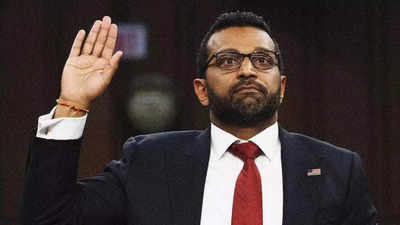Kashyap “Kash” Patel, the Indian-origin lawyer and lately appointed FBI Director beneath Donald Trump, has publicly embraced his cultural roots, sharing an article on social media that highlights how his Hindu upbringing has formed his worldview, values, and management model. The publish, which has since gone viral amongst Indian-American and pro-MAGA circles, gives a uncommon glimpse into the private convictions of a person extra usually identified for his takedowns of the so-called deep state.
The article traces Patel’s journey from his immigrant household’s modest beginnings to the higher echelons of US authorities, with a constant thread working via it: the affect of Hinduism on his life. Raised in a standard joint household family in New York, Patel’s childhood was steeped within the practices, festivals, and ethical teachings of Hinduism. His father, Pramod Patel, fled Uganda through the brutal regime of Idi Amin in 1972, finally settling within the US after a quick stint in India. His mom, Anjana Patel, grew up in Tanzania. Collectively, they constructed a house the place arduous work, training, and respect for elders weren’t simply inspired—they have been sacred.
Sharing the article on X (previously Twitter), Patel underscored how the values of dharma, karma, and seva—righteous responsibility, motion with accountability, and selfless service—have guided his private {and professional} journey. “Kash’s upbringing was rooted within the values of Hinduism—arduous work, respect, and training—values which have influenced his worldview,” the article states. It goes on to notice that his dad and mom raised him to “respect all religions, embodying the message of common tolerance famously delivered by Swami Vivekananda in his 1893 speech on the World Parliament of Religions in Chicago.”
Patel’s deep respect for his cultural heritage was on full show throughout his Senate affirmation listening to for the FBI position. Earlier than delivering his opening remarks, he turned to his dad and mom within the viewers and touched their ft—an age-old Hindu gesture of reverence and gratitude. The act drew consideration on either side of the political aisle, symbolising a uncommon and visual assertion of Indian cultural values within the coronary heart of American energy.
Patel, a outstanding determine in conservative US politics, usually displays spiritual markers related to Hindu traditions. He’s ceaselessly seen sporting a sacred thread (kalava or mauli) on his wrist—a standard signal of Hindu religion. He has publicly mentioned “Jai Shri Krishna,” invoking the Hindu deity Lord Krishna, which is each a greeting and a devotional exclamation. Such expressions align with broader Hindu customs, like touching dad and mom’ ft as a mark of respect, lighting diyas throughout Diwali, or visiting temples throughout important festivals. These practices spotlight his cultural and religious identification, particularly as Hindu values acquire extra visibility in diaspora communities.
Capping off his assertion, Patel invoked a phrase not often heard in such settings: “Jai Shri Krishna.” The salutation, that means “Victory to Lord Krishna,” reverberated via the listening to room, changing into an instantaneous speaking level on social media and WhatsApp teams throughout the Indian diaspora.
Whereas the gesture drew reward from many within the Indian-American group, it additionally stirred the same old backlash from liberal commentators who noticed it as a mixing of faith and governance. Nonetheless, Patel has by no means made apologies for his background or beliefs. In truth, he has persistently argued that the energy of American democracy lies in its capability to accommodate and embrace various cultural expressions.
Patel’s visibility as a Hindu public determine is important, particularly in a political ecosystem the place Indian-American illustration has usually been confined to sanitized cultural references. In contrast to others who distance themselves from India’s civilisational heritage for worry of political incorrectness, Patel has leaned into his identification—whether or not it’s supporting the Ram Mandir in Ayodhya, quoting Swami Vivekananda, or criticising Western media for what he calls “biased narratives” about India.
The FBI chief’s public embrace of his Indic roots marks a shift not simply in how Indian-Individuals are represented, however in how they signify themselves. For Patel, being American and being Hindu will not be contradictory identities—they’re complementary. And in an period the place identification politics dominates public discourse, his unapologetic integration of each worlds sends a strong message.
Patel’s rise additionally provides a layer of complexity to Trump’s 2024 marketing campaign and the broader MAGA coalition. Removed from being a monolith of evangelical Christians, Trump’s internal circle now features a rising variety of Indian-origin figures—Patel, Vivek Ramaswamy, and Usha Vance, amongst others—who carry a definite cultural and philosophical worldview into conservative politics.
Along with his newest social media publish, Patel has made it clear that his Hindu upbringing isn’t just a footnote in his biography—it’s a dwelling, respiration power that continues to information his selections, inform his ethics, and outline his mission. In doing so, he has opened the door for a broader dialog about what it means to guide whereas remaining anchored in a single’s cultural heritage.
Because the article he shared notes, “Whereas Patel leads a secular establishment, his background and values inform his method to governance.” It provides that his “promise to revive justice and equity” is guided by each private conviction and religious grounding.














